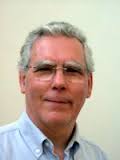 From Guest Writer: Reverend Peter Neilson, Mentor, Macedonian Ministry St. Andrews, Scotland
From Guest Writer: Reverend Peter Neilson, Mentor, Macedonian Ministry St. Andrews, Scotland
It was a cold November day, sitting with my wife by a log fire in a country hotel. It had been a crazy few weeks and this was the first free day we had enjoyed together – out for lunch and a quiet day.
“I think I should resign from my job in the Church of Scotland,” I said. Dorothy almost fell off her seat. I had been baptised and brought up in the Church of Scotland. I had come to faith in Christ, been called into ministry and served the church for 40 years. I was embedded in the Church. She could not imagine my stepping away from that well-known path.
I had no idea what lay ahead, but I was sure of the calling to step outside the institution. I had come to see that I was viewing our culture through an institutional lens, and my missional instincts urged me to step outside and take a different viewpoint.
Fast forward two years, and we had moved house to develop a mission consultancy and retreat centre. We had moved from the city of Edinburgh to a beautiful fishing village by the sea. All was well, but there was a strange unease within me.
God spoke to me in two ways. I was reading a book by William Bridges a well known consultant on managing transitions. After publishing his main books, his wife became ill with cancer and, after five years of treatment, she died. He was devastated and felt that he had been wasting his time as a consultant. His confidence withered. Until he realised that he was experiencing what he had often described as a necessary phase of transition between the old ending and the new beginning – a phase he called “the neutral zone”.
He had always advocated the need to leave that space before rushing to the new future – and to help people through its haze of confusion, anxiety and disorientation. Now he knew personally what he had taught theoretically.
This time he used new words. He spoke of “disenchantment” – not cynical disillusionment, but coming out from under the spell of the past, just as I had had to break free of the spell of the institutional view of reality. He spoke of “dis-identification” – an ugly word for the loss of identity which I had felt when I stepped into worlds where old reputations meant nothing. And he spoke of “disloyalty” – when the essential choice of letting go feels like letting people down.
That was me. I was in transition. I was in the neutral zone. Every word stuck to me like a magnet. I was being plagued by a nagging guilt that I had let people down by withdrawing my labour from the church when we were dangerously short of ministers.
And then God spoke again. A few months later, at a conference where we spent the first hour of the morning in silence, a young man who did not know my background approached me and asked if I played tennis. I used to but not now. “You have to draw the lines on the court for others to play, but you are not to play the game.” Again he asked if I played squash. I never had. “You are to be the wall where people bounce the ball, but you are not to play the game.”
He could not have known my secret guilt, but God did. Letting go can feel like letting down. But letting go is the first step in transition. Let go – and trust The Catcher.







No Comments